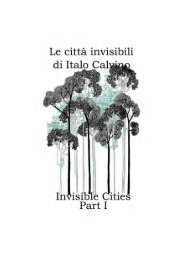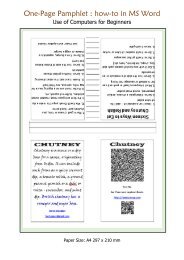Footnote to Rebecca
At the end of Daphne du Maurier's novel Rebecca, we do not know what became of the young girl who narrates the story; nor do we know what happened to the sinister housekeeper Mrs Danvers. This is the last word of Rebecca - twenty years after.
At the end of Daphne du Maurier's novel Rebecca, we do not know what became of the young girl who narrates the story; nor do we know what happened to the sinister housekeeper Mrs Danvers. This is the last word of Rebecca - twenty years after.
Create successful ePaper yourself
Turn your PDF publications into a flip-book with our unique Google optimized e-Paper software.
San Paper and Layabout Books<br />
www.sansap.com<br />
san2paper@gmail.com<br />
ZINE<br />
Chapbook
I started my tale of <strong>Rebecca</strong> with<br />
the last line at the beginning: Last<br />
night I dreamt I went <strong>to</strong> Manderley<br />
again. Yet, my s<strong>to</strong>ry is not quite<br />
done; there is a footnote <strong>to</strong><br />
append—the true last word.<br />
Who might care <strong>to</strong> read it? No one,<br />
I suspect. No one will read this. I<br />
know no one. Did I ever? I never<br />
had friends of my own but kept up<br />
appearances of friendship <strong>to</strong> please<br />
Max. Now there is no one <strong>to</strong> please<br />
or impress, so I please myself - here<br />
where I linger alone on this almost<br />
island of Desenzano which appears<br />
filled with rag dolls. Indeed,
fashions in clothes may change but<br />
the people inside them never do.<br />
It is the festival of Carnevale. Shall<br />
I wear a mask and pretend <strong>to</strong> be<br />
young again?<br />
I look across the lake from my<br />
balcony. Snow is withering on the<br />
Alps in a glitter of cold decay. The<br />
word 'yesteryear' comes <strong>to</strong> my<br />
mind.<br />
'Colazione,' announces Marta the<br />
housekeeper. Francesca, the new<br />
domestic girl, serves rolls and<br />
frothy coffee clumsily. I eat little<br />
these days and cannot sleep.
What is the note I meant <strong>to</strong> add? It<br />
is trivial but puts my mind at ease.<br />
Max brought me here. Count<br />
Galeazzo Ciano, who insisted we<br />
call him Gian, became a friend. Life<br />
passed in a whirl of amusement.<br />
Even the War did not distract us at<br />
first. Then Gian fell from power<br />
and Max <strong>to</strong>ok <strong>to</strong> binging drink.<br />
He would not have lasted long on a<br />
diet of gin. A bullet from a<br />
communist spared him his final<br />
decline. Like <strong>Rebecca</strong>, he feared a<br />
lingering death. I became a widow<br />
and kept a small portion of my
estate but the villa was seized. My<br />
circumstances are modest. I do not<br />
repine. Here I am and here I stay<br />
for the duration. There is nowhere<br />
else <strong>to</strong> go. There is no one I know.<br />
Looking across the lake at that land<br />
of cuckoo clocks, I remember the<br />
head of the Swiss National Bank<br />
who observed: 'When you have<br />
money, there is nothing <strong>to</strong> say; and<br />
when you do not, there is no one <strong>to</strong><br />
talk <strong>to</strong>.'<br />
The note - the promised footnote -<br />
it is neither a revelation nor a<br />
resolution. It is a brief encounter
after the War.<br />
I saw a group of concentration<br />
camp survivors arrive <strong>to</strong> be trucked<br />
<strong>to</strong> a resettlement centre for<br />
Displaced Persons. An older woman<br />
stared at me curiously. I recognised<br />
her. She was much changed but<br />
clearly the dark housekeeper of<br />
Manderley, Mrs Danvers, the last<br />
person in the world I knew; but I<br />
had not known she was Jewish.<br />
Without thinking I blurted out<br />
'Danny!' She stared back at me<br />
savagely. I did not know what <strong>to</strong><br />
do. 'Can I help in any way?' I asked<br />
foolishly and reached for my purse.
She dismissed me with a sneer.<br />
'Unlike you, I have not led a sad life<br />
- though lonely, perhaps, since<br />
<strong>Rebecca</strong> died. I was brought up <strong>to</strong><br />
expect little and am not<br />
disappointed.'<br />
She climbed in<strong>to</strong> the back of the<br />
truck and disappeared. I knew I<br />
would never see or speak <strong>to</strong> her<br />
again.<br />
Stephen Colbourn<br />
2022
Who was <strong>Rebecca</strong>?<br />
<strong>Rebecca</strong> is a 1938 Gothic novel<br />
written by English author Daphne<br />
du Maurier. The novel depicts an<br />
unnamed young woman who drifts<br />
as a lady’s companion in upper class<br />
circles at Monte Carlo.<br />
She impetuously marries a wealthy<br />
widower named Maxim de Winter<br />
who is twenty years older than<br />
herself. At his country house<br />
Manderley in Cornwall she<br />
discovers that both he and his<br />
household are haunted by the<br />
memory of his late first wife, the<br />
title character <strong>Rebecca</strong> whom Max<br />
may have murdered.
Last night I dreamt I went <strong>to</strong><br />
Manderley again . . .
















